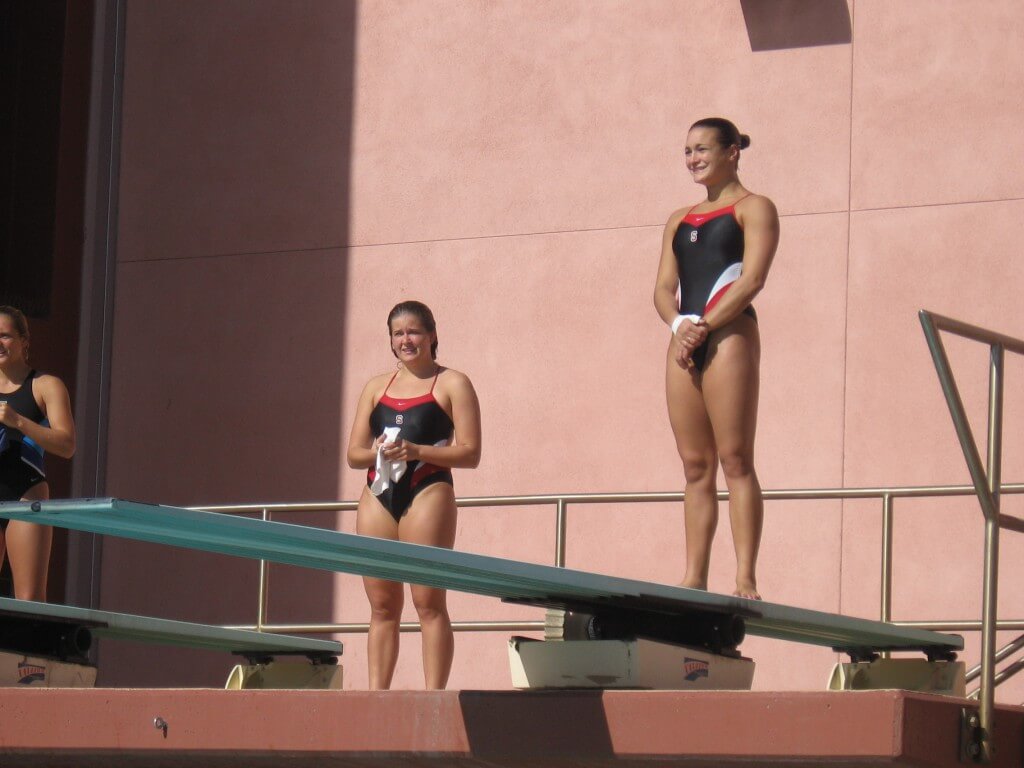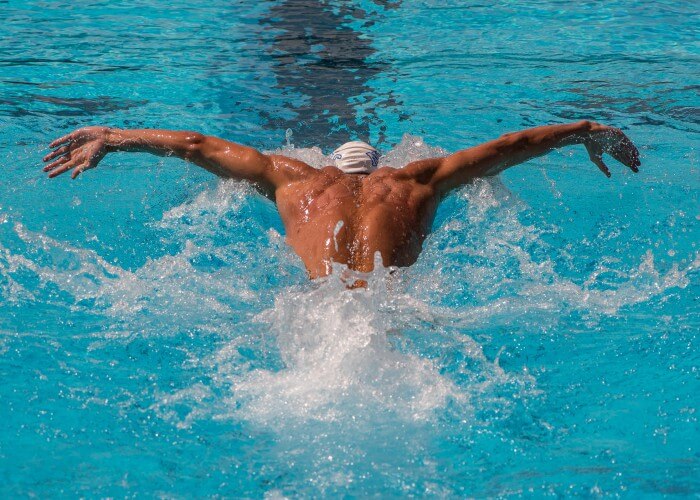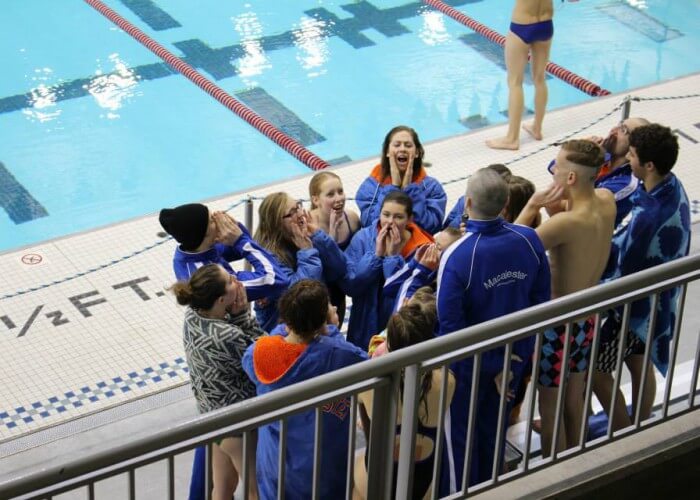Diving Investigated…By A Swimmer

By Sarah Lloyd, Swimming World Intern
This weekend I sat down with my sister, Molly Lloyd, to talk about diving. Confession: I didn’t actually sit down with her, I sent her a list of questions through email and she answered them, but it’s kind of hard to sit down with someone who is 760.4 miles away (according to Google Maps). Molly’s a sophomore at Macalester College in St. Paul, Minnesota and a member of their diving team, so logically, she was the best person to ask when I decided I wanted the ~*inside scoop*~ on what diving is really like. She, like she always is, was patient with my silly questions and occasionally gave me equally silly answers.

Molly Lloyd and teammate Anik Regan at the MIAC Swimming and Diving Championship Photo Courtesy: Alese Halvorson
S: Why do you enjoy throwing yourself off of things that are so high AND flip, twist, and stuff while doing it?
M: I don’t really know why I like to throw myself off of such high things, maybe I’m just a thrill seeker? I think there’s something really satisfying about doing something that could end really, really poorly, but having it not end poorly. There’s a lot of risk involved. Is that masochistic? (S: I think diving is absolutely terrifying to watch, let alone do, so I don’t quite understand this, but Molly has always been way more of a daredevil than me. I understand the masochism, though.)
S: What does it feel like to smack? (I’m told than in diving lingo, smacking means hitting the water at not the optimal angle–essentially bellyflopping. Or backflopping. Or sideflopping. How about just flopping?)
M: Smacking feels like getting fave starred (slaps which leave a mark) a bunch of times, all over your body. Depending on the severity, it stings for a while and gets really hot. I’ve heard horror stories of people smacking and coughing up blood. It’s definitely dependent on what dive you’re doing and how you particularly land, but I’ve hit my face a few times and it’s pretty rough. (S: Nope, nope, nope. Definitely not interested.)
S: What’s this business about not shaving your legs before meets?
M: Not shaving our legs before meets? I don’t shave my legs for pretty much the entire season! If your legs are too smooth, they get really slippery and you can lose your grip in the middle of the air and if that happens, there’s a really good chance you’re going to smack. The leg hair pretty much gives us a little bit more friction – a little bit more to hold on to.
S: What is one thing about diving that you think every swimmer should try?
M: I just think that all swimmers should have to jump off the three meter at least once in their lifetime. It’s fun and scary and builds character. (S: I’ve done it and she’s right.)
S: Is there a direct correlation between the time you spend in the hot tub and the quality of your dive? Asking for a friend.
M: In my opinion, if you made a graph with “amount of time spent in hot tub” on the x-axis and “quality of dive” on the y-axis, I’d say it’d look pretty similar to the normal curve of anxiety (x-axis) vs productivity (y-axis). If you’re not warmed up at all and are feeling pretty cold, you’re not going to do so well. On the other hand, if you spend too much time in the hot tub, you’re not going to feel so good getting out of it. I’d like to think there’s a happy medium. (S: By the way some of my diver friends talk about the hot tub, I would have thought that it was a positive exponential relationship, but apparently not.)
S: How do you keep your eyes open during the whole dive? Because sometimes I find myself swimming with my eyes closed and I just don’t think I could keep them open if I was flipping in the air.
M: It’s actually sometimes really hard to keep our eyes open the entire time, but we also know that if we close our eyes while doing something difficult, it could end really badly. We need to be able to spot things in the air so we know when to stop twisting or kick out of a flip, so that’s a good incentive to keep our eyes open the entire time. The prospect of smacking is too daunting. (S: Everything has the consequence of smacking, apparently.)
S: What’s one thing about swimming that you would never try?
M: One thing from swimming that I would never try is anything involving exhaustive amounts of butterfly. I can do the 100 IM–I swam that multiple times during summer swim team, but anything that involves more than a 25 of butterfly is not for me. Props to you for swimming the 400 IM consistently. (S: Sometimes I feel the same way about butterfly, honestly.)
S: Do you ever look at a swimmer and think to yourself “Yeah, you can swim for miles at a time, but I can do more crunches than you can”?
M: Honestly…yeah, sometimes. A key component to diving is having a killer core (which I recognize is also important in swimming, but…), so I’m always impressed by swimmers’ endurance, but part of me knows that I’ll always have a tiny leg up when it comes to core (especially pike holds). (S: We’re also way less flexible most of the time, so I guess you guys have us on that one, too…)
S: What is the most physically taxing part of diving? What about the most mentally taxing?
M: Diving surprisingly gets your heart rate up, especially when you’re rallying and just going up and down and up and down. Also, it’s really hard sometimes to get your body to do what you want it to do, which I think leads into the mental aspect of diving. For me, the most mentally taxing part of diving is either getting yourself to do a new dive for the first time and getting over that fear, or it’s messing up over and over again – which is incredibly discouraging – and having to push yourself through it in order to get better.
S: Do you feel like you’re just as much a part of your team as a swimmer? Or do you feel different somehow?
M: I personally feel as much a part of the team as any swimmer does, but I also recognize that it varies from team to team. Because I was the only diver first semester of last year, I didn’t have any other divers to fall back on, so I naturally tried my best to be as much of a part of the swim team as I could, and they all tried their best to include me in all things swimming-related. On other teams where there are more divers, I’m sure there is a split between divers and swimmers, but I’m glad there isn’t one on the Mac team.
S: Do you ever wish that it was called the Diving and Swimming Team? Do you feel left out or somehow less than the swim team sometimes?
M: Well, having it called “Swimming and Diving” after a while gets a bit old. It gets frustrating after a while getting called a swimmer everyday by people who aren’t on the team, and then I have to explain to them I’m not a swimmer, I’m a diver, and they argue that swimming to the side of the pool after doing the dive counts as me swimming so, technically, I’m a swimmer (you’d be surprised at just how often I’ve heard this argument), and then I just give up and don’t argue anymore. I’m thinking about making a couple “Macalester Diving and Swimming” t-shirts just for kicks, but keep that on the DL. (S: I guess the cat’s out of the bag now, Mo. Sorry.)
S: What is the most rewarding part of diving for you?
M: I think the most rewarding part of diving is the self-betterment that comes with it. Like swimming, you can numerically track your progress in diving, and it just feels so good when you finally rip the dive you’ve been working on for weeks. It’s really nice being able to look at your score sheet at the end of the meet and say to yourself, “Wow, I improved so much on these two dives since I last competed, I feel really good about this.” Amen.
S: 10/10 would recommend?
M: Perfect 10s are hard to come by in diving, but yes, 10/10, would most definitely recommend. (S: I see what you did there.)
S: Mom wants you to call her.
M: Mom and I just FaceTimed.
Check out Molly’s questioning of Sarah on swimming here– “Swimming Investigated…by A Diver.”







Sarah, I’m just impressed that you remember enough math to use the phrase “positive exponential relationship”